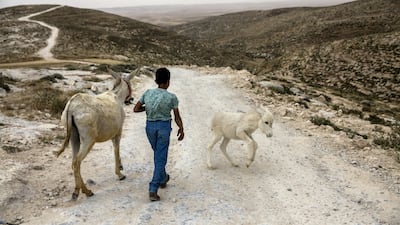Israel's Supreme Court has held a hearing over an attempt to displace more than 1,000 Palestinians from a rural part of the occupied West Bank that the Israeli army has designated for military exercises.
The army wants to demolish eight small communities in a rocky area of the southern West Bank near Hebron.
Petitioners say it would make more than 1,000 Palestinians homeless and endanger their nomadic way of life, making a living from farming and herding.
The high court is expected to hand down a ruling soon after more than 20 years of legal manoeuvring.
The area, spanning 3,000 hectares, is known to Palestinians as Masafer Yatta and to Israelis as the South Hebron Hills. It lies close to the West Bank-Israel boundary.
“They have been dragging us from one court hearing to another for 22 years,” Othman Al Jabareen, one of the Palestinian petitioners, said in court.
“God willing, the justices will let us stay on our land because we have no other option.”
The Israeli state prosecutor told Tuesday's hearing: “The Israeli military has conclusively stated the crucial importance of this firing zone for military training. We have looked into that issue over and over.”
In 1999, the military displaced hundreds of Palestinian inhabitants from their homes after declaring the area a firing zone. Initial petitions were filed in 2000 and a court ordered the Israeli government to allow the residents to return pending a final ruling.
After repeated delays, the government and military filed responses to the Palestinian petitions in 2012.
Palestinian residents said they have been denied building permits, with the army demolishing any new structures including houses, water wells and solar panels.
Meanwhile, the military has conducted only sporadic exercises.
In pictures — a shepherd watches his flock in the Holy Land
Palestinians in the area also say they have struggled to connect to water and electricity networks to which nearby Jewish settlements built on occupied land have access to.
“This case is not about a firing zone; it is about taking control of land because, unlike other areas, most of this land is privately owned,” said Shlomo Lecker who, along with the Association for Civil Rights in Israel, is representing 200 of the Palestinian families under threat of displacement.
“In effect, this is land expropriation without compensation.”
Outside the Jerusalem court, dozens of Israeli protesters opposed to the country's occupation of the West Bank since a 1967 war held up signs reading “Families, not firing zones” and “Masafer Yatta is not a military playground".

